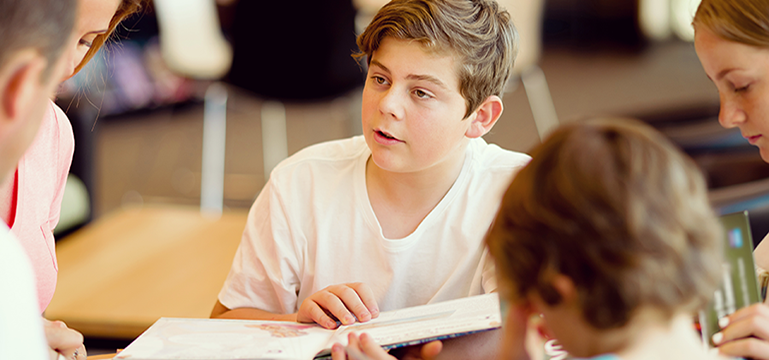Changing the structure of the school council

Quick links:
Information about the school
Ysgol Gyfun Bryn Tawe is a Welsh-medium secondary school for 800 pupils between 11 and 18 years old. The school is situated in the north of Swansea and 30.2% of pupils live in the 20% most disadvantaged areas in Wales and 10.6% are eligible for free school meals. Twenty four per cent (24%) of pupils are on the school’s additional learning needs register and 1.8% have a statement of special educational needs. Around 10% of pupils come from Welsh-speaking homes and nearly all pupils speak Welsh fluently. The school has a Welsh-medium language, speech and communication unit for primary and secondary age pupils in the city and county of Swansea.
Context and background to the effective or innovative practice
Historically, the school council followed the traditional structure of electing one boy and one girl from each year to represent the pupil’s voice. These pupils would work diligently to realise the council’s objectives, but there was great pressure on only around 15 pupils. Although year councils also existed, the school felt that not enough pupils were represented on the school council and, as a result, not enough pupils contributed towards critical and key changes within the school.
Description of the nature of the strategy or activity
It was decided that six different councils would be established under the umbrella of the school council, with each council working on specific priorities. The six councils are the Teaching and Learning Council, the Welshness Council, the Health and Wellbeing Council, the Environmental and Eco Council, the e-Learning Council and the Charity Council. All of the councils respond to the United Nations Conventions on the Rights of the Child and, specifically, the right to voice an opinion and to be heard.
The practice of electing pupils was removed. All pupils who are keen to contribute and lead on one of the councils now write an application letter which identifies their skills and relevant experience, in addition to their vision for the year’s work. This enables pupils to participate in councils that are of particular interest to them and, as a result, the councils’ work has been more successful.
In addition to the work with the school council, listening to the pupil’s voice is an integral and continuous part of reflecting and planning in all departments and for the Areas of Learning and Experience.
What impact has this work had on provision and learners’ standards?
Changing the structure of the school council has had a striking effect on the number of pupils who now engage fully in roles and responsibilities to lead improvements within the school. Annually, more than 60 pupils, including those who are eligible for free school meals and those with additional learning needs, work every week on issues that are important to them in order to ensure that the school is a happy and caring community that continues to aim for excellence. The councils’ work is shared regularly in school assemblies and governors’ meetings, and pupils take the lead in ensuring that everyone is aware of the ways in which they have a direct effect on school life.
The Teaching and Learning Council is passionate about expanding pupils’ cultural knowledge. By working closely with specific departments and teachers, they have ensured a stronger emphasis on Welsh history and culture across the curriculum, and have shared their views about the most beneficial and useful experiences in lessons through video clips and presentations in staff meetings. These pupils work with particular departments and have a direct effect on what happens in the classroom. The Charity Council raises thousands of pounds every year and charities are nominated by the pupils themselves, sometimes following personal experiences. The Environmental and Eco Council has ensured that there are plastic recycling facilities in all classes, and the Welshness Council holds language awareness sessions and wider activities for the school’s younger pupils and schools in the cluster, which have a positive effect on pupils’ attitudes towards Wales and their Welshness. The e-Learning Council also works closely with Digital Wizards from primary schools in the cluster in order to develop digital skills and share good practice, in addition to holding valuable training sessions for staff and pupils.
How have you shared your good practice?
The school shares work based on the pupil’s voice regularly with parents, governors and the local community through its website and the school’s Twitter account. It works closely with other schools in the City and County of Swansea to promote the pupil’s voice by attending termly events to share the good practice of schools across the county. In particular, the Welshness Council and e-Learning Council work closely with primary schools in the cluster to develop positive relationships, share good practice and ensure consistency when transitioning between key stages 2 and 3. Pupils have also presented their work within the council to the headteachers of south Wales network of Welsh-medium schools.